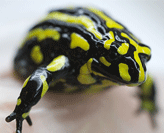Frog Research
Giant leap forward in frog conservation

In a world first, the Wildlife Biodiversity Co-operative Research Centre, a consortium of 40 institutions led by the University of Newcastle, will use genome storage technologies to manage Australian frog species under threat of extinction.
"Presently, the sole strategy for threatened impacted wild frog populations is captive breeding programs. This project will develop breakthrough technology to generate offspring from stored genomes for use in frog breeding and reintroduction programs," said Bid Director Professor John Rodger.
Frog populations have declined rapidly in recent decades, with a third of the species now listed as threatened worldwide. Eastern Australia has been identified as a global hotspot of frog decline.
"This research is aimed at safeguarding frogs against emerging threats. Through genome storage technology we can store novel strains and genes that bestow resistance against threats, in this case disease," said Professor Rodger.
Australia's most critically endangered frog, the Southern Corroboree Frog, and other species highly likely to be impacted by environmental change will be targeted through the research.
"It is estimated that less than 100 Southern Corroboree Frogs exist in the wild. Disease, habitat loss and global warming are contributing factors to the decline of the species," said Professor Rodger.
At risk due to Chytridiomycosis – a disease caused by the fungal organism Batrachochytrium dendrobatidis (Bd), Southern Corroboree Frogs are found only within a very small region within the sub-alpine area of Kosciuszko National Park in New South Wales and the Australian Capital Territory.
If successful in its funding bid, the Wildlife Biodiversity CRC will carry out research on how this disease impacts frog species across Australia and New Zealand, including the World Heritage Area of Tasmania and Kosciusko National Park.
Contact
- Sheena Martin
- Phone: +61 2 4921 8714
Related news
- Shanae’s passion for caring delivers her dream to work in health
- Food and nutrition degree serves Keren a rewarding career
- Kicking goals on and off the field, Joeli proves you can do it all
- Proving age is just a number, Arlyn wants to inspire more women in their 50s to pursue education
- Earth Sciences expert Professor Frisia cements global standing
The University of Newcastle acknowledges the traditional custodians of the lands within our footprint areas: Awabakal, Darkinjung, Biripai, Worimi, Wonnarua, and Eora Nations. We also pay respect to the wisdom of our Elders past and present.